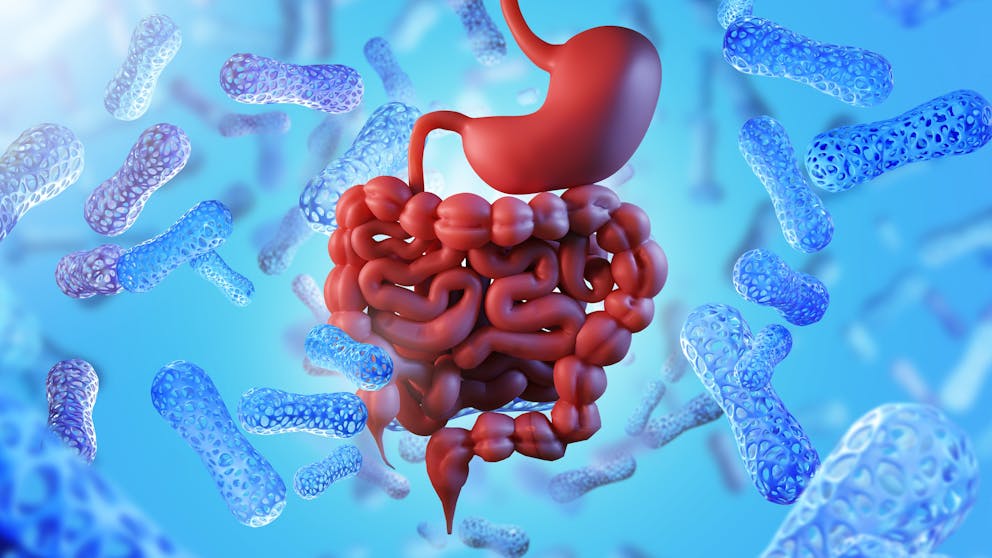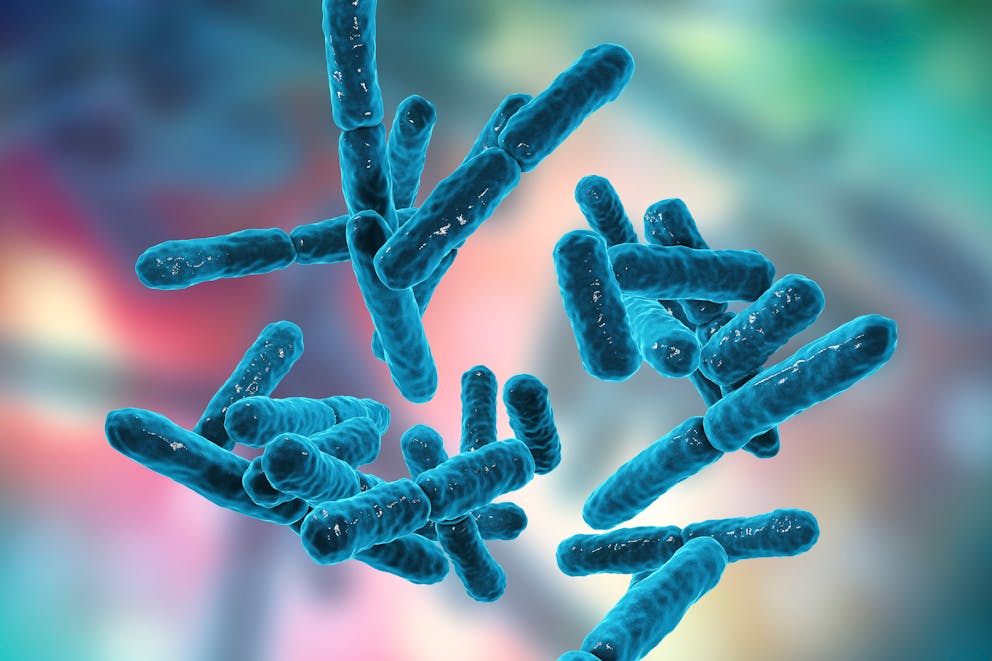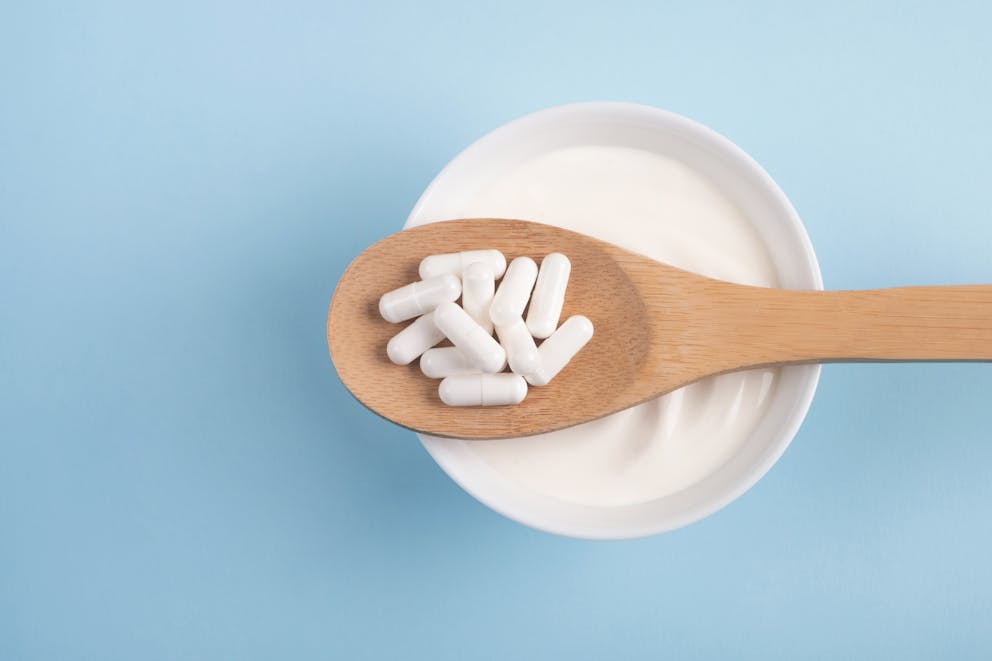Seven Incredible Health Benefits of Probiotics
Probiotics support a diverse gut microbiome, which plays a profound role in regulating immune functions, supporting digestive health, and preventing the overgrowth of potentially harmful bacteria.
Discover seven benefits of probiotics and learn if you may need more friendly microbes in your digestive system.

What are probiotics?
Probiotics are live microorganisms that naturally reside in your body and play an essential role in regulating immune system functions and maintaining a healthy digestive system.
These microorganisms are often referred to as good bacteria, and consuming probiotic-rich foods or supplements promotes a diverse gut microbiota, which is linked to various health benefits.
To be classified as a probiotic, a microbe must be:
Alive when consumed
Present in the human digestive tract
Linked to health benefits
Safe for consumption
Maintaining a healthy balance of beneficial microbes in your gut helps prevent the overgrowth of potentially harmful bacteria associated with a wide range of health conditions, including irritable bowel syndrome, food allergies, depression, and atopic dermatitis.
“It’s hard to quantify just how important a diverse intestinal microflora is for human health,” explains Dr. Berg. “Probiotics are an incredible tool to promote digestive health, strengthen immune defenses, aid detoxification, and improve metabolic health.”
Watch the video below to learn more about the health benefits of probiotic bacteria.
Types of probiotic microbes
The intestinal microflora is a complex ecosystem consisting of bacteria, yeasts, and viruses.
Evidence published in Gastroenterology and Hepatology suggests that “The human gut microbiota contains approximately 300 to 500 bacterial species, and the number of bacteria within the gut is approximately 10 times that of all of the cells in the human body.”
While more research is needed to investigate all of these microbes regarding their application as probiotics, certain strains of bacteria and yeasts have well-established health benefits and are commonly used in probiotic supplements and functional foods.
Here are some of the common types of probiotic microbes:
Lactobacillus strains: Lactobacillus acidophilus, Lactobacillus casei, Lactobacillus rhamnosus
Bifidobacterium species: Bifidobacterium lactis, Bifidobacterium longum, Bifidobacterium breve
Yeasts: Saccharomyces boulardii, Saccharomyces cerevisiae

Seven benefits of probiotics
Although probiotic foods have been used for centuries to promote gut health, modern microbiology allowed a more profound understanding of how the microflora influence various physiological functions.
Research published in The Journal of Food and Drug Analysis confirms that probiotics benefit microbiome diversity and concludes that “Probiotics have shown positive responses to diarrhea, irritable bowel syndrome and food allergies and may play a role in preventing diabetes, obesity, and certain cancers.”
Check out these seven incredible health benefits of probiotics.
1. Strengthen immune function
Probiotics interact directly with your immune system and stimulate the maturation and activation of immune cells, which supports the development of a robust and effective immune response.
In addition, probiotics enhance your body’s ability to detect and tolerate harmless substances, such as food proteins, which plays a crucial role in preventing food allergies and sensitivities.
Your immune system is mostly gut bacteria, and an imbalanced microflora can significantly increase the risk of allergies and the development of autoimmune conditions such as Crohn’s disease, rheumatoid arthritis, and multiple sclerosis.
2. Speed up digestion
Adding probiotics to your wellness routine can help your digestive system work more efficiently.
Certain probiotic strains have been found to produce enzymes that aid in the digestion of carbohydrates, proteins, and fats, which enhances digestion and promotes optimal nutrient absorption.
Probiotics maintain a slightly acidic environment in the gut, which has digestive health benefits and prevents the overgrowth of potentially harmful intestinal microorganisms linked to chronic inflammation, irritable bowel syndrome (IBS), mood disorders, and metabolic imbalances.

3. Improve gastrointestinal issues
Probiotics promote the proliferation of healthy bacteria, which is associated with improved gut health and a lower risk of gastrointestinal disorders.
A study published by Alimentary Pharmacology and Therapeutics suggests that probiotics have been found effective in managing lower abdominal pain, bloating, and irregular bowel movements and may be particularly beneficial for individuals with ulcerative colitis and inflammatory bowel disease (IBD).
Probiotics can significantly lower the risk of antibiotic-associated diarrhea and help repopulate beneficial microbes after antibiotic drug treatment.
4. Promote metabolic health
Beneficial gut bacteria ferment soluble fiber, which generates large amounts of short-chain fatty acids (SCFAs), the primary fuel source for intestinal microbes.
SCFAs have also been linked to improved metabolic health as they stimulate the production and activity of glucagon-like peptide 1 (GLP-1), a hormone that regulates insulin secretion and blood sugar balance.
By promoting balanced blood sugar levels, SCFAs can reduce the risk of metabolic imbalances such as insulin resistance, obesity, and type 2 diabetes, which explains why antibiotics can contribute to weight gain.
5. Recycle bile salts
Probiotics play a crucial role in recycling bile salts, which are essential for properly digesting dietary fats and absorbing fat-soluble vitamins.
Gut microbes conjugate bile acids, thereby increasing their solubility and stimulating the reabsorption of bile salts into the enterohepatic circulation.
It’s estimated that almost 95 percent of bile salts are recycled by intestinal microorganisms, and a lack of beneficial bacteria can lead to digestive issues, including poor fat absorption, sluggish digestion, and nutrient deficiencies.

6. Support detoxification
Certain probiotics can bind to and neutralize toxins and heavy metals in the gut, which lowers the toxic load on the body and helps prevent heavy metal toxicity.
In addition, a study published in Microorganisms found that probiotics, especially Lactobacillus, can bind to and eliminate aflatoxins. Aflatoxins are a highly toxic type of mold associated with liver damage, impaired immune function, and cancer development.
7. Support mental well-being
Probiotics can benefit the central nervous system and may offer a natural and effective way to support mental health.
Evidence published in Behavioral Brain Research suggests that individuals with inadequate microbiome diversity are at significantly greater risk of depression than those with a balanced intestinal microflora.
Probiotics help optimize the production of serotonin, a crucial neurotransmitter that regulates brain function and moods.
In addition, probiotics have been found to enhance the production of Brain Derived Neurotrophic Factor (BDNF). BDNF is a critical compound for brain plasticity and neuronal health associated with a lower risk of mood disorders, age-related cognitive decline, and dementia.

Signs you need more friendly microbes
While probiotics can benefit many individuals, they may be particularly helpful if you have a history of frequent antibiotic use, experience chronic stress, or regularly consume alcohol, sugar, and processed foods.
According to evidence published by UCLA Health, these factors can significantly impact microbial diversity and increase the risk of dysbiosis, characterized by the overgrowth of potentially harmful microorganisms.
Common signs that you may benefit from probiotics include:
Weak immune defenses
Inflammatory bowel disease
Recurring urinary tract infections
Constipation or diarrhea
Food allergies
Unexplained weight gain
Mood disorders
Fatigue
Skin conditions, including eczema, psoriasis, and dermatitis
![]()
Safety and side effects
The long-term safety and efficacy of probiotic supplements have been studied extensively.
A review published in Food Control investigated the safety profile of probiotics and summarizes that “The results of most of the safety studies have not demonstrated any toxic effects of probiotic bacteria.”
However, probiotics contain live microorganisms, and it’s essential to be aware of potential side effects and understand who should not take probiotics.
Potential side effects of probiotics
While probiotics are generally well tolerated by most people, they can result in some side effects, especially during the early phases of probiotic supplementation.
Mild digestive symptoms, including gas and bloating, are the most common adverse effects of probiotic supplements and are a result of your digestive tract adjusting to changes in the composition of the microflora.
It's important to note that these side effects are generally mild and transient and typically improve with continued use of probiotics.
However, if you experience persistent or severe gastrointestinal discomfort after taking probiotics, it's crucial to consult a healthcare provider for a thorough evaluation of your symptoms.
Who shouldn’t take probiotics?
Individuals with a weakened immune system and those taking immunosuppressant drugs or undergoing chemotherapy treatment are at increased risk of microbial infection and shouldn’t take probiotic supplements.
Some people can be allergic or sensitive to certain components in probiotic supplements. If you have a history of probiotic-related infections or adverse reactions, it’s recommended to avoid using any probiotic-containing product.

Sources of probiotics
Probiotics can be obtained from probiotic-rich foods and probiotic supplements.
Fermented foods provide an ideal environment for beneficial bacteria to thrive and multiply. As a result, fermented foods are a natural source of probiotic microorganisms.
Here are some of the best probiotic-rich foods:
Kefir
Sauerkraut
Tempeh
Natto
Miso
Kombucha
Yogurt
Cheese
In addition to these food sources, probiotics are also widely available as dietary supplements, including capsules, tablets, powders, and liquids.
Probiotic supplements are a safe and effective way to increase your gut bacteria diversity and may be particularly beneficial for individuals who don’t consume adequate amounts of probiotic foods due to dairy allergies, lactose intolerances, or sensitivities to fermented foods.
What to look for in a probiotic supplement
When choosing a probiotic supplement, it's essential to consider several key factors to ensure maximum health benefits while minimizing the risk of side effects.
Look for a probiotic supplement formulated with a variety of well-researched probiotic strains, such as Lactobacillus and Bifidobacterium species, to promote a diverse and balanced gut microbiome.
Check the label for colony-forming units (CFU), a measure that indicates the number of viable microorganisms in the product, and opt for a supplement with at least 60 billion CFU per serving.
A high-quality probiotic supplement should contain prebiotic extracts that serve as food for the beneficial bacteria in the gut and enhance the effectiveness of probiotic microbes.
Opt for probiotic supplements packaged in a delayed-release capsule that ensures the survival of microbes through stomach acid, or choose a high-quality liquid probiotic supplement.

The importance of prebiotics
The composition of your intestinal microflora profoundly impacts many critical physiological functions, and a balanced and diverse microbiome is crucial for overall health.
Many factors can influence microbial gut diversity, and it’s well-established that antibiotic use, stress, alcohol, sugar, and processed foods can negatively impact your microbiome.
Probiotics help replenish beneficial microbes, which are associated with strong immune functions, mental health, and optimal digestive and detoxification processes.
While fermented foods are an excellent source of probiotics, many people don’t consume enough to promote microbial diversity, and probiotic supplements are a safe and effective way to support a thriving intestinal microflora.

Key takeaways
It’s hard to ignore the impressive benefits of probiotics for healthy digestion, immune function, and mental well-being. Taking probiotic supplements can be a safe and effective way to support a healthy body.
It’s best to choose a probiotic supplement that contains at least 60 billion CFU per serving and offers a variety of well-researched probiotic strains to promote microbial diversity.
Additional resources
FAQ
1. What are the benefits of taking probiotics?
Probiotics support a diverse intestinal microflora, which is associated with a healthy digestive system, strong immune defenses, enhanced detoxification processes, balanced neurotransmitter levels, and mental well-being.
2. Is it good to take a probiotic daily?
Taking a probiotic supplement daily helps replenish beneficial microbes, which promotes a diverse and balanced intestinal microflora.
While probiotic supplementation benefits most people, it can be especially helpful for individuals with sluggish digestion and those who suffer from gastrointestinal conditions, including irritable bowel syndrome (IBS), inflammatory bowel disease (IBD), and acid reflux.
3. What are the signs that probiotics are working?
While signs that probiotics are working can vary depending on individual health status, most people notice improved digestion, enhanced immune functions, and better overall health.
If you are taking probiotics to manage gastrointestinal conditions, an improvement in symptoms indicates that probiotic supplementation positively impacts your digestive health.
4. What are the downsides of taking probiotics?
Taking probiotics can cause side effects such as abdominal gas and bloating, resulting from your microbiome adjusting to changes in its composition. However, these side effects are typically mild and resolve within a few days of continuous probiotic use.
5. How long should I take probiotics?
Taking probiotics daily for several months replenishes beneficial microbes and helps recolonize the intestinal microflora.
However, individuals with a history of frequent antibiotic use and those with gastrointestinal health conditions such as IBS and IBD may benefit from significantly longer periods of probiotic supplementation.
6. What are the signs you need probiotics?
Individuals with digestive issues, food allergies, frequent infections, and recurrent urinary tract and yeast infections can benefit from taking probiotics to help restore a healthy gut microbiome.
Additionally, those with a history of antibiotic use, chronic stress, and poor dietary habits might find probiotic supplements helpful in promoting overall health and well-being.
7. Who shouldn’t take probiotics?
People with compromised immune systems, such as those undergoing chemotherapy or organ transplant recipients, are at increased risk of microbial infections and should avoid taking probiotics.
In addition, individuals with underlying health conditions or those with a history of adverse reactions to probiotic supplements should exercise caution and seek medical advice before starting probiotic supplementation.
8. What are probiotics?
Probiotics are live microorganisms that naturally reside in the human gut and offer a range of health benefits by promoting a balanced gut microbiota.
These beneficial microbes are found in fermented foods and probiotic supplements, and taking probiotics has been found beneficial for gut health, immune function, mental well-being, and detoxification.
Sources
https://www.sciencedirect.com/science/article/pii/S1021949818300309
https://www.sciencedirect.com/science/article/abs/pii/S0166432822003497
https://www.uclahealth.org/news/want-to-boost-immunity-look-to-the-gut
https://www.sciencedirect.com/science/article/abs/pii/S095671351930461X
Previous blog
Five Foods High in CreatineTags

Popular
08/21/2024
55K views
02/23/2025
46.3K views
11/18/2024
277.5K views
03/18/2024
11/21/2022




